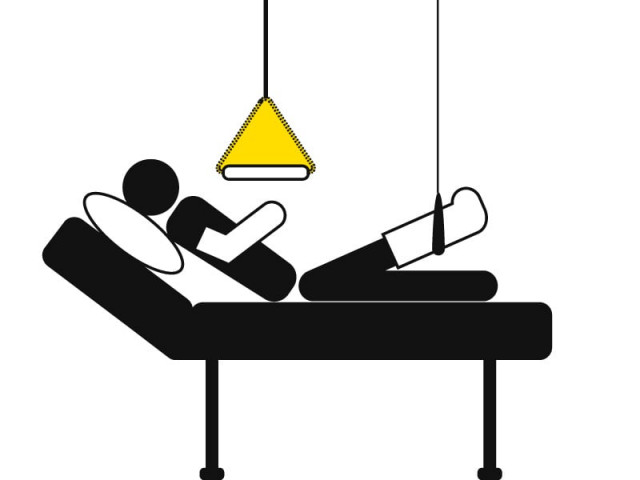Injured men just bite the bullet at police hospital
Policemen complain that they have to jump through bureaucratic hoops to get treatment.

It is certainly tough being a law enforcer in Sindh - with the perpetual incidents of terrorism, sectarian conflict, target killing and robberies, the probability of sustaining major injuries is quite high. But what is even worse is that there is only one medical facility in Karachi for the 110,000 policemen across the province.
Thirty-five-year-old police constable, Bisharat Ali, is a victim of a terrible road accident that happened in Larkana about three weeks ago. Though he escaped the jaws of death, his own set of jaws was fractured so badly that he cannot eat solid food. His eyes were damaged and his left leg and nose were also broken in the mishap.
Despite this long and gruesome list of wounds, the doctors have only prescribed Brufen and Ponstan - two medicines which are used for common aches and pains.
Lying in a bed in one of the solitary wards of the Police Hospital in Karachi, Ali cursed the system. The most agonising indignity for him is that he cannot relieve himself in bed as there are no male nurses. “I carry him to the washroom,” said his younger brother. “We are not sure how long this will go on. Some doctors come for a routine round and recommend the same medicines over and over again.”
Ali had to fight with his superiors in order to come to Karachi for treatment. He first sought treatment at PNS Shifa, but was kicked out 15 days later. “The staff at the hospital told me that the police department had not paid the bills,” he said in a barely audible voice.
The Police Hospital, which has 62 beds, is not equipped to deal with emergencies or surgeries for bullet wounds. There is no CT scanner or MRI machine or instruments to do cardiovascular checks either. The place seems to be spotless, but the absence of paramedics gives it a deserted look.
The medical superintendent, Roshan Ali Bhatti, said that the total annual budget of the hospital is just three million rupees, which comes down to around Rs125 per bed per day. “We have to give the patients meals as well as medicines and meet doctors’ expenses within this meagre amount.”
On a recent afternoon, there were only three patients in the male ward, which had over 30 beds. Bhatti denied that patients are not interested in getting treatment at the hospital because of the lack of facilities. “Most of the constables who complain about the dearth of equipment are the ones who we turn away because they are not sick or injured and just want a break from their duties,” he said. “The hospital needs at least Rs20 million every year. The entire facility has been built on donations - one businessman paid for the tiles, another one provided funds for the beds and two private banks have footed the bill for construction work.”
Bhatti said that all the policemen who need medical help are referred to other public hospitals where treatment is free. But police constables and traffic wardens complain that they have to pull all sorts of strings for even the most basic checkups.
Rahim Baloch, a police constable, was shot in the leg last week. He was taken to PNS Shifa but the doctors said they would only operate after receiving Bhatti’s signature. “It is the job of the DSP and SHO to take care of the paperwork,” he said. “The constables have been helping each other out in their absence.”
For the traffic wardens, the lack of medical facilities is especially troubling. Standing all day at busy intersections amid pollution, they become victims of illnesses from which they cannot recover. A chest specialist at the hospital said that at least two wardens were being diagnosed with lung cancer every month. Scabies, varicose veins and asthma are common among them, he said.
Published in The Express Tribune, December 20th, 2011.



















COMMENTS
Comments are moderated and generally will be posted if they are on-topic and not abusive.
For more information, please see our Comments FAQ